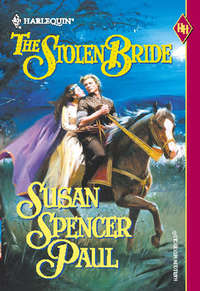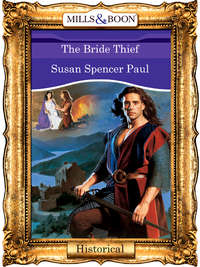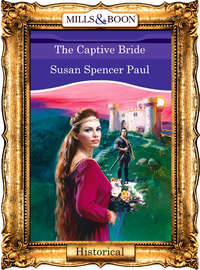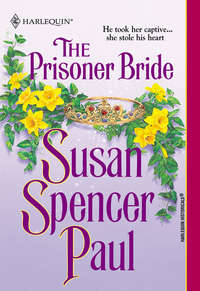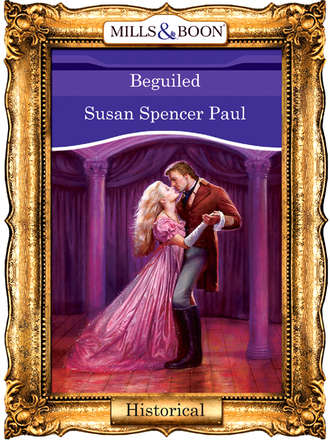
Полная версия
Beguiled
“Thank you, my lord,” Lady Isabel put in with satisfaction, lifting her chin in Lord Daltry’s direction.
“Don’t you think you should return the control of her mount to her?” Graydon suggested.
Lord Daltry scowled darkly. “Not that I’d care if the little fool broke her neck, but I think it might be wisest if I escorted her back to Wilborn Place and had a word with Lord Cardemore. He should be apprised at once of his niece’s reckless behavior.”
“Much good that will do you,” Lady Isabel stated. “My uncle’s the one who taught me to ride.”
“Somehow,” Lord Daltry said tightly, “that doesn’t surprise me. You certainly ride like the devil’s daughter. Or niece. If it were up to me—”
“I beg your pardon, Lord Daltry,” Lady Isabel interrupted in icy tones, at last wrestling her reins from his grip while her horse danced confusedly beneath her, “but it is not up to you.” She moved her steed a safe distance away from him before adding, “I should like to return home now, Lily.”
Lady Lillian responded with several fluttering movements of her hands, too rapidly for Graydon to make any sense of.
“Apologize?” said Lady Isabel, clearly having no difficulty in understanding what the other girl was saying. “Absolutely not. Never. Ever.”
Lord Daltry made a huffing sound. “Probably doesn’t even know how to.”
Lady Isabel pinned him with a hot glare. “If Lord Daltry has been insulted and requires satisfaction, he may challenge me to a race and determine for himself which of us is the better rider.”
At this, Lady Lillian made more hand movements, drawing Graydon’s fascinated gaze. It was her way of talking, he realized, but it was so fluid, so rapid—like the fluttering of hummingbird wings. How did Lady Isabel manage to interpret it?
“We are from the country, Lily,” Lady Isabel said in terse reply, “and if Lord Daltry wishes to tease us about that fact then he’s not the sort of gentleman that Lord Graydon obviously is.” She graced Graydon with a stunning smile. “If I must apologize, it will be to him for causing him to endure such an unfortunate scene. I do apologize, my lord.”
“Please don’t worry over the matter, Lady Isabel,” Graydon replied. “I always strive to enjoy Lord Daltry’s mad fits, often as they occur.”
“Most wise,” said Lady Isabel, while Lord Daltry glowered at his friend.
“We’ll not detain you further,” Graydon said, including both women in a charming smile. “If it’s convenient, may I have the pleasure of calling upon you ladies this afternoon to take you driving? I should deem it a great honor to show you something of London.”
With a delighted enthusiasm that Graydon found both touching and amusing, Lady Lillian and Lady Isabel assented, and the two men were shortly riding away.
“Fits?” Lord Daltry asked. “Mad fits?”
Graydon shrugged lightly. “I don’t know what else you’d call chasing after a perfectly happy female who had her mount under complete control and treating her like the veriest child. Really, Matthew, you astound me. Why didn’t you just grab Lady Isabel by the hair and drag her about the park like a heathen cave dweller?”
Lord Daltry straightened in his saddle. “I don’t want to talk about that female, if you please. I don’t even want to hear her name. Never met a more pestilential woman in my life. She’ll have London on its head before the season’s done, mark my words. Did you make any headway with Lady Lillian?”
Graydon gave an assenting nod. “I think it’s going to work out quite well. She’s a charming girl, and can make herself understood more ably than I’d expected. Whatever her upbringing was, it must have been good enough to give her the confidence to express herself. I may try to engage Miss Hamilton’s aid in the matter,” he added more thoughtfully. “She’s always been tenderhearted to the less fortunate, and if she’ll befriend Lady Lillian, I’ve no doubt matters will proceed much more smoothly.”
“That’s not a bad idea,” Daltry said approvingly. “With Miss Hamilton for an ally, none of the other comeouts will dare be uncivil. But what,” he asked directly, “will you tell her?”
“She’s already aware that I’ve undertaken to introduce two young ladies from the country into society. I needn’t tell her anything more, although Miss Hamilton is such a gentle soul that she wouldn’t turn them away even if she knew the full truth.”
“Please,” Daltry said, “don’t tell her. I don’t fancy spending the next ten years visiting you in prison. And I doubt Miss Hamilton would care for it, either.”
Graydon laughed out loud. “I’ve no intention of giving Cardemore a reason to be displeased. Never fear, Matthew. Lady Lillian will enjoy her stay in London. I’ll devote myself to the task entirely.”
“It may be harder than I first thought,” Daltry admitted. “I didn’t understand any of those hand movements she made. Looked like a sorcerer’s trick.”
“I didn’t, either,” Graydon said, “but before you and Lady Isabel returned she used a different method of communicating that was quite charming. If I can somehow convince her to use it with others, I believe she’ll readily conquer even the most unforgiving members of the ton.”
“You sound more confident than you did two nights ago.”
“I am. All I need to do is make certain she’s out and about town as often as possible, meeting the right people and making the right friends. Her beauty and Cardemore’s power should do the rest in securing Lady Lillian’s place in society.”
“I hope that’s true, my friend,” said Lord Daltry.
“As do I. Most fervently.”
Chapter Six
Graydon spent the remainder of the day making plans and visits. The plans, he knew, were only as good as upcoming circumstances, or the Fates, might make them. He wrote his steward at St. Cathyrs with instructions to proceed with the land improvements they had agreed upon. Having met and, to some degree, successfully communicated with Lady Lillian, he at last felt comfortable in taking such a step. To his mother and sisters he wrote a determinedly lighter, more entertaining missive, striving to erase any fears they might have taken from the steward’s behavior. Not that Graydon believed his competent employee would have spoken of or shown his concern regarding the warnings of impending doom that Graydon had recently sent him, but the ladies of St. Cathyrs were remarkably sensitive, and Graydon, having spent a lifetime drowning in their well-meant concern, had learned early on to nip such worries in the bud. In addition, he wanted his mother in London. It was true that Countess Graydon rarely came to Town, and his sisters seldom more, if they could avoid it, yet his dainty, slightly lunatical mother still welded the respect and power claimed by only the staunchest of the ton’s matrons to ably launch a young lady, regardless of the particular young lady’s imperfections. If Lady Lillian could weather his mother’s and sisters’ peculiar brand of coddling, she’d have nothing left to fear in the way of making her way through the ton’s treacherous waters.
The visits were, on the whole, more predictable. Frances and her mother, Lady Hamilton, received him in the usual fashion, making him feel exactly like what he knew he was: an extremely eligible, highly titled, unmarried peer of the realm. The prize of the season’s marriage market, just as he had been the season before, and the season before that, and even the season before that. He’d had more young women thrown at him during the past four years than he could either remember or give count to, but had successfully managed to escape wedded bliss, or even the consideration of it, until the right woman had finally been thrown at him.
Frances.
She was as delightful in her own right as she was in her physical form, and he had realized, shortly after having met her, that she was the ideal wife for him. Graydon had very nearly decided to make her an offer this season. Nearly. He wasn’t altogether certain what it was that held him back. He was fairly sure of the depths of his own feelings—if he didn’t actually love Frances, he certainly admired and held her in great affection—and he had good reason to believe that she felt similarly toward him. She had given him every indication that if he should ask her to become his wife, her answer would be a positive one.
And yet he held back, waiting for something that he couldn’t define. Something foolish, he often told himself, chiding. Something ridiculous. A bolt out of the heavens when he looked at her, perhaps, or a light-headed feeling when he kissed her lips—as he had already done twice without feeling even the least bit dizzy—or some kind of heart-pounding sensation, anything, that would tell him he would never regret making her his wife.
His visit with her this afternoon only served to confirm to Graydon how foolish he was to hesitate. Frances and he were ideal for each other, both in mind and spirit, and he would surely never find another such lady, so sweet and intelligent and understanding.
He presented himself at Wilborn Place at half past four, and was informed by the earl’s dour butler that the earl wished to speak with him before Graydon took Lady Lillian and Lady Isabel on their planned drive.
The study to which Graydon was taken was by now familiar to him as that place where Cardemore carried out most of his dealings. This time, the earl was already in the room, waiting.
“You’re here,” Cardemore said, glancing up from the papers on his desk as Graydon walked through the door. “Good. Sit down.” He nodded to the chair Graydon had occupied on his earlier visit. “I suppose you already know what I want to discuss.”
“I can guess,” Graydon replied, staring down at his host from behind the chair, where he continued to stand. “Your minion took no permanent damage, I hope. I shouldn’t want to have the man out of the way of useful employ. Such a one shouldn’t be allowed to live off the largesse of the workhouse.”
Cardemore smiled in an unpleasant way. “Perhaps you’d prefer to make him the responsibility of the jails? Never fear. I take care of all those in my employ, one way or another.”
Graydon didn’t doubt that in the least. He wondered if the little man who’d made such a pest of himself, having made a muddle of his assignment, was even still breathing. “I’m glad to know it,” he replied evenly. “Send another such a one to shadow me and I can promise I’ll not leave so much to care for.”
Cardemore gave a grunt of amusement. “You’ll not be bothered again, I give you my word. Little though you may credit it, my word is as reliable as death.” His attention still given to his papers, which he was neatly piling into different stacks, he added tersely, as though Graydon were an aggravating and misbehaving servant, “I offered you a chair.”
With an effort, Graydon didn’t react with so much as a raised eyebrow. “You may take your chair, my lord, and go to Hell. If you wish to speak with me, then I advise you to speak. Otherwise, I’ll not keep Lady Lillian and Lady Isabel waiting.”
With an abrupt movement, Cardemore sat back and regarded his guest. “It isn’t so much what I might say to you, Graydon,” he stated with cool intent, “but rather that I believe you have something you wish to say to me.”
The muscles in Graydon’s jaw tightened painfully, and for a moment his anger was so white-hot that he thought he would say something truly unwise. But he remembered himself, and remembered the sort of man Cardemore was—one not to be dealt with lightly, or, worse, foolishly.
“If you received the message I gave your minion, then you already know my sentiments. I should be curious to know, however, why you neglected to tell me that Lady Lillian cannot speak, and why you seemed to find such information irrelevant.”
A look of irritation crossed Cardemore’s scarred features, and he replied, gruffly, “Lily can speak. She chooses not to do so for reasons of her own. As you say, I find the fact irrelevant, both in regard to Lily and in regard to your seeing to it that she enjoys her time in London. However you may view the situation, whether Lily speaks or does not speak has no bearing on the task set before you.”
“So you say,” Graydon replied. “Because of your lack of care, I very nearly humiliated her. At Almack’s. Even you, with your disdain of the accepted social customs, must realize what that would have meant to her.”
“It would have been unfortunate,” Cardemore admitted, “especially for your mother and sisters. You may think me an unconscionable swine for subjecting Lily to such a chancy situation, but I felt assured of your response. You and your kind are too well-bred to so readily fall on your faces. You’d shatter before you’d crack. Isn’t that so, Graydon?”
“You,” Graydon said quietly, “take much for granted.”
“Aye,” Cardemore concurred with a thin smile. “There is often little other choice for a man in my circumstances, which is why planning for any eventuality is so needful. If you had, by chance, brought Lily sorrow, you would know by now how unfortunate a mistake it was.”
“Your threats, sir, grow wearisome. I find it difficult to believe that Lady Lillian is in any way related to you.”
At this, Cardemore uttered a laugh. “I find it the same, and ever have. Lily’s a beauty, isn’t she? Charming, wellmannered and thoroughly delightful. She’s so unlike the rest of my family that I’m often tempted to believe the fairies left her, rather than that my father, especially, had any part of her. But that is neither here nor there.” He waved one hand outward. “You want to know why Lily doesn’t speak, is that not so?”
“It would be helpful.”
Cardemore gave him a measured look before saying, “She was born in a perfectly normal state, despite the fact that the birth was complicated and my mother died a few hours later. She was an extraordinarily quiet baby, seldom crying, which evidently led my thick-skulled fool of a father to believe that she was somehow mentally deficient. I suppose if she had squalled night and day as my brother and I probably did, he would have assumed she was perfectly hale. As you have seen for yourself, she is.”
Graydon inclined his head.
“When Lily was three years of age, so some of the older servants tell me, she had only just begun to speak, later than most children, perhaps—” he gave an indolent shrug “—but not so extraordinarily late as to give proof to my father’s belief in Lily’s mental failings. She was, these same servants insist, a bright and clearly intelligent child. If allowed to progress in her own manner, I have no doubt that even my stubborn father would have at last admitted his mistake. But it was around this time, shortly after Lily’s third birthday, that one of the serving maids lost her own young child, an unfortunate event that subsequently caused her to madden. For some reason, she decided that Lily would be better off dead, and to that end she mixed lye into the milk in Lily’s silver cup and served it to her with her dinner in the nursery.”
“God in heaven,” Graydon murmured, horrified.
“Indeed. She nearly died from ingesting the poison, most of which, fortunately, she spat out, else she never would have survived. A long illness and high fever followed. To my father’s credit, Lily was surrounded by the finest doctors and given every care. To his discredit, he refused to believe these same doctors when they insisted, after Lily recovered, that her sudden inability to speak or even utter a sound was due to the inflammation that had severely scarred her vocal cords. He was convinced that she was an idiot, just as he had been convinced of it before, and as she could no longer even make a human sound, he refused to have anything more to do with her. She was given over to the care of the servants, who learned to keep her out of my father’s and brother’s way, and had not, until I inherited the title, even been given the benefit of a tutor. Lily could not read or write a word until she was twelve years old. She couldn’t speak a word until two years later, when she was fourteen.”
“But she can speak?” Graydon pressed.
“She can, although it is painful for her to do so, and she grows weary after a brief effort. Also, it is very…difficult. Lily dislikes the sound of her voice. The scarring makes it impossible for her to achieve anything remotely feminine, although, for my part, I find her speech delightful. Still, she prefers the sign language.”
“The sign language,” Graydon repeated more thoughtfully. “This morning, in the park, she and your niece, Lady Isabel, were communicating in such a way, with their hands.”
“It is the same method that is taught in France at the Royal Institute for Deaf-Mutes, by Abbé Sicard, of whom I am sure you’ve heard tell. One of Sicard’s most ardent disciples, Mr. Charles Cassin, has established a school here in England using these very methods, modified, of course, to English. Before doing so, however, he lived at Cardemore Hall for five years, serving as Lily’s tutor, also as mine and the rest of my household’s. Every one of us, including the servants, learned the sign language for Lily’s benefit.”
His words presented Graydon with a baffling picture of the Earl of Cardemore, very different from the one he presently held. The man must care for his sister if he went to so much difficulty, going so far as to require even his servants to learn a language that they would most likely only ever use with Lady Lillian. He realized, suddenly, why she had been so confident in coming to London. Cardemore, for all his wickedness, had given her that.
“But there are other methods of training deaf-mutes, are there not?” Graydon asked. “Better methods? The French sign language has not been widely used here.”
“Not here in England, no, although it has been widely accepted in other parts of the world. Here the oral method is the approved manner of dealing with deaf-mutes, although it seems to be a method better suited to those who can hear and speak than it is for the deaf-mutes. We tried that with Lily, at first, but since she is not entirely deaf, she can hear the sound of her own voice and, as I have said, dislikes it. Eventually she became so unhappy that my sister-in-law, Lady Margaret, insisted that we find an alternative. Charles Cassin came to us after that, and the change in Lily was both rapid and remarkable. She’s made up for a good deal of lost time with Mr. Cassin’s help.”
“Remarkable,” Graydon agreed. “You said that she is not entirely deaf? I had not realized she was deaf at all, for she seemed to hear perfectly during our time at Almack’s, also this morning in the park.”
“She hears well enough, save for in her left ear, which was affected during her youthful fever and has since only been partly useful. Her right ear seems to have escaped damage. Her lungs were also scarred, although to a lesser degree. She’s taken ill several times with an inflammation, and nearly died of it twice. I advise you, however, to avoid the topic of health altogether whenever you’re in Lily’s hearing. Unlike a good many other females who rely upon their wilting frailties to produce conversation that never fails to bore one and all, if Lily ever thought you considered her of delicate health, she would most likely break your nose to prove the matter to you otherwise.”
Graydon could barely suppress the smile Cardemore’s words wrought. The notion of the sweet creature who had so utterly charmed him only a few hours ago launching a fist at his nose was laughable.
“You’re taking Lily and Isabel driving?” Cardemore asked. “They’ll be rather more awed by the experience than other ladies of your acquaintance. Thus far, London seems to have made a grand impression upon them. It’s understandable, of course, being their first visit to Town. They’ll need close watching, however. I shouldn’t like either of them to seriously misstep.”
At that, Graydon did raise an eyebrow. “Am I to understand that I now have the care of both Lady Lillian and Lady Isabel? Who will there be next? A male second cousin from Brighton who fancies a tour of London’s most notorious hellholes? How far—exactly—must I go to repay my debts?”
For the first time that Graydon had ever seen, the warmth of sincere amusement touched Cardemore’s features. “If any such person existed,” he said, “I believe I could despoil him better than you, and certainly much more quickly. As to Isabel, I believe I made myself clear when we first spoke on the matter that I expect you to make both her and Lily’s way clear into fashionable society. As far as Isabel is concerned, that is all I require. Although I do have a bit of advice to pass on to your friend Daltry, who seems to have elicited Isabel’s particular dislike. He’d do best to go lightly with a female like that. She’s much more dangerous than she looks, and as you’ve seen for yourself, she looks deadly.”
“I believe it’s too late for warnings, my lord,” Graydon said. “I should like to leave you one of my own, however.”
“Would you?” Cardemore sounded mildly interested.
“I’ll tell you this only once. I am not a frippery young lord, and it is to your own folly that you mistake me for one. I’ll do what I must to smooth Lady Lillian’s and Lady Isabel’s way into society, and I shall make certain, as best I can, that your sister enjoys her visit to London, but I will not do so under threat by either yourself or your minions. You will leave me in peace to fulfill my word of honor. If you cannot, then you may burn St. Cathyrs to the ground now and we’ll have no more to do with each other.”
“Well said,” Cardemore returned without a pause. “A better speech than even Wellington can lay claim to, I imagine. I am not, however, as you might realize, a man who much admires speeches. Prove yourself, and I will do what you ask. As to being followed, I’ve already given you my word.”
“Then we have an understanding,” Graydon stated with a nod. “I’ll bid you good-day, my lord.”
After the door closed and he was alone, Cardemore spent a full silent minute shuffling through his papers again before shoving his work aside and saying, “Come out, Porter.”
A closet door opened on the other side of the room and the man who had served as Graydon’s shadow walked out.
“Ah ooh thatithfied, mah ord?” he said.
Cardemore rose from his chair. “Don’t speak, Porter. It’s painful to hear. And sit down before you fall.” He moved to the room’s lone window, pushing the drapes aside just enough to keep an eye on the street below. “Am I satisfied? Aye, I am. Very satisfied, indeed. He’s better than I could have hoped for. Perhaps not the man I would have chosen for a brother-in-law, but he’ll be a good husband to Lily or live to regret it.” A thin smile played on his lips. “Somehow, I doubt it will ever come to that.”
He turned to his minion, who sat nursing his aching head in both hands.
“I want you to proceed as planned with the kidnapping. Lily’s comfort is to be of utmost importance. I won’t have her harmed in any way. You can do as you please with Graydon, so long as he isn’t permanently injured. And make certain everyone involved understands that the blame is to be laid at Saxby’s door. I don’t want Graydon or Lily ever discovering who’s truly behind their brief imprisonment. Certainly not until they’re married. There are to be no slips. No mistakes. Do you understand, Porter?”
“Ess, mah ord,” Porter replied obediently.
“Make certain of it. If anything should go wrong, you’ll have more to worry about than a broken jaw. Much more.”
Chapter Seven
At night for the past three years, just before she fell asleep, Lily had lain quietly in her bed and let herself dream of all the exciting things that a young lady having her first season in London might experience. Being driven through a London park at the fashionable hour of five o’clock in the company of a handsome gentleman had been among her favorites, but Lily had been realistic enough never to let herself believe that the event would actually happen. The closest she would get, she had told herself with all practicality, would be in coercing her brother to take her out one afternoon. But Aaron disdained fashion almost more than he did the ton, and, although he would dutifully perform the task, Lily had too often envisioned the constant scowl he would wear, and the dark comments he would make, and had given up on the idea long before she and Isabel had ever even set foot in London.


